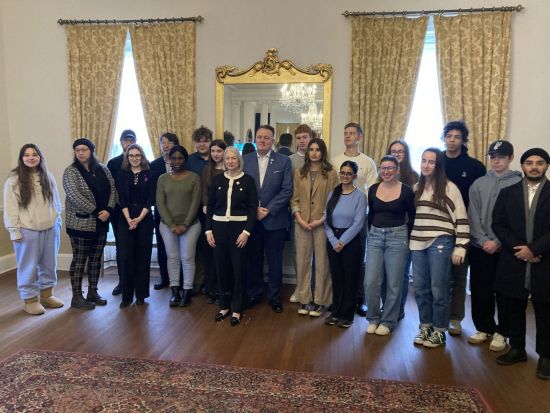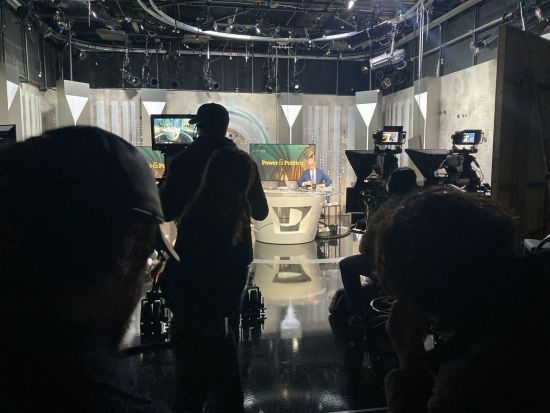How Canada’s next generation of political leaders are rising to steer us in a positive direction

An update from the Jarislowsky Chairs in Trust and Political Leadership
There’s a strong possibility that our country’s future local, provincial, and federal representatives—even a potential Prime Minister—are attending this university right now. If they happen to be mentored by one of Canada’s five Jarislowsky Chairs in Trust and Political Leadership, that’s something to cheer.
That’s because these Jarislowsky Chairs are on a mission to raise the bar when it comes to the ethics, integrity, and trustworthiness that Canadians should be able to expect from their leaders. University professors Dr. Alex Marland (Acadia University), Dr. Stéphane Paquin (l’Université du Québec à Trois-Rivières in collaboration with École Nationale d’Administration Publique), Dr. Cristine de Clercy (Trent University), Dr. Susan Dieleman (University of Lethbridge), and Dr. Michael MacKenzie (Vancouver Island University), and are the Chairs taking on the duty of shaping Generation Z into ethical, informed, and capable political leaders, public servants, and engaged citizens.
To the delight of the students involved in the initiative, this ambitious goal is being achieved through an immersion of unique learning experiences. This includes in-class conversations with politicians, gaining behind-the-scenes access to legislative chambers, attending community events like town halls and public debates, and visits to TV sets featuring Canada’s top political commentators.
“This program has given me a lot more hands-on experience with Canadian politics,” says Acadia Masters student and Jarislowsky research assistant Mae Graham. “I’m actually able to meet and interview individuals who participate in politics currently and that’s a huge opportunity.”
Navigating the new political landscape

To say we’re in “interesting” political times right now may be the understatement of the year. With a new Prime Minister in place, near daily shake-ups blasting out of the Oval Office, rising concerns about civil rights, and local costs of living becoming harder to bear, today’s students—and Canadians as a whole—have a lot to talk about. Add to this the disinformation spread over social media, deepening polarization between parties and their supporters, and evidence of external election interference – and, yes, it’s all very “interesting” indeed.
With these issues and more front-of-mind, the Jarislowsky Chairs are working to ensure their students develop the leadership qualities and skills needed to navigate this tricky environment. In addition to understanding the mechanics of good governance, students are encouraged to be lifelong learners who stay curious, adaptable, and develop resiliency—key traits for future leaders and engaged citizens in an evolving time.
There are additional reasons for optimism. “This generation has role models from diverse backgrounds, making it easier for more students to see politics as a space where they can make a meaningful impact,” says Acadia’s Dr. Marland.
Learning in and out of the classroom
At each of the five campuses, the Chairs are focused on developing new courses and experiential learning opportunities—including guest lectures, workshops, and field trips—to prepare students for careers in public service. Each of the Chairs has tapped into their networks of politicians, media professionals, community leaders, and civil servants (ranging from strategists to policy writers) to give their scholars access and exceptional insights into local, provincial, federal, and international political inner workings. Students are also encouraged to use their emerging connections to start building social capital now.
For example, Dr. Paquin arranged for his students to attend a summer school in Tokyo that brought together political grads and undergrads from Quebec, France, and Japan. This provided many with a first dose of international relations and network building, something of increasing importance in Canada’s political future.
The Chairs have also been collaborating to create pan-Canadian initiatives to foster shared learning experiences across the country, including the development of co-organized events over the summer. The largest focus has been on the creation of a Certificate in Democratic Leadership, which will launch in some of the universities as early as Fall 2025 (pending education commission approval). This program will feature courses tailored to each university, with all institutions offering a shared foundational course, Introduction to Democratic Leadership. To support this, the Chairs will produce video content in their areas of expertise, ensuring a rich, multi-perspective learning experience. Courses will be delivered in French at l’Université du Québec à Trois-Rivières, and in English at the four other participating universities.
The latest at Acadia University
In Wolfville, Nova Scotia, the young politicos at Acadia are making big strides in their understanding of what’s needed for leadership roles in public service. Acadia’s efforts are supported by a $2M gift from the Jarislowsky Foundation, a match of $2M from other donors including Scotiabank and Floyd Murphy (’69), and additional generosity, including a $500k donation from the RBC Foundation.
At Acadia, Dr. Marland’s program focuses on creating memorable, expert-driven experiences that undergrad and grad students would rarely have access to. For example, his students recently welcomed Hon. Bill Morneau, Canada's former finance minister, for a Q&A session in the midst of their POLS 3133 (Leaders and Cabinets in Canada) lecture.
Meaningful opportunities are happening outside of the classroom as well. In February 2025, Dr. Marland organized a field trip to Ottawa. During the trip, students visited key political institutions like the House of Commons, the Senate, Rideau Hall, and the Supreme Court, while also engaging with public figures. Their time was also spent learning from media professionals, including a rare chance to hang in the wings of the set of CBC’s Power and Politics and have dinner with a Globe and Mail journalist. And since those who cannot remember the past are doomed to repeat it, Dr. Marland’s students also benefited from visits to the Canadian Museum of History and the Canadian War Museum.
Three Acadia Masters students currently have Jarislowsky Studentships to support their research into political leadership, and two more will join them in 2025-26. Paid research assistant positions through the Jarislowsky Chair also allow students to commit more of their time toward their passions while gaining realistic, evidence-based decision-making experiences.
Gillian Brown is among the master’s students currently participating in the Jarislowsky program at Acadia. “With this support, I’ve been able to take advantage of opportunities that have sharpened my perspective, not only in the study and practice of Canadian politics and political leadership, but also on what options are available to me after I graduate, and how I can achieve them.”
A real-world advantage

The program has garnered considerable positive feedback from the public as well. Young political staffers have expressed how much they wish they’d had access to such experiences during their own education. Even alumni in their 70s have noted how beneficial these opportunities would have been in their careers, and some retirees have been auditing courses.
Program participants already recognize and appreciate this as a special opportunity. “The Jarislowsky Chair has provided me and the rest of the cohort with exceptional research, teaching, and event experience along with resources and a community that I wouldn’t have been able to access at any other university,” says Gillian.
Investing in a strong Canadian future
The Jarislowsky Chairs in Trust and Political Leadership are part of a bigger effort by the Jarislowsky Foundation to level up Canadian talent and advancements. The Jarislowsky Foundation was founded in 1991 by Stephen Jarislowsky, a prominent Canadian philanthropist and business leader. The Foundation's mission is to promote, support and foster excellence and ethics in education, medicine and the arts, and the environment and climate change.
The Foundation supports more than 50 research chairs in universities, museums, and major institutions across Canada in a variety of domains, such as, democracy, governance, public sector management, healthcare, arts and culture, the environment, and climate change.
The Foundation supports programs that allow students from diverse backgrounds to discuss contemporary issues with mentors and recognized experts. These programs aim to develop students' critical thinking skills so that they become leaders with strategic vision and thinking.
The Jarislowsky Foundation supports more than 110 organizations a year in the arts and culture, hospital foundations, the community sector and climate change.
The Jarislowsky Foundation now donates approximately $15 million per year.
The opportunities directed by the Chairs are thanks to funding pooled from The Jarislowsky Foundation, the universities themselves, and generous donors such as Scotiabank, a supporter of the program at all five institutions.
Want to get the Acadia experience with Dr. Marland?
In the Fall 2025 semester, Dr. Alex Marland will be teaching POLS 2023 (Introduction to Democratic Leadership), the anchor course in the new Certificate in Democratic Leadership (pending approval by the Maritime Provinces Higher Education Commission). You can also discover more about the Jarislowsky Chairs in Trust and Political Leadership by following Dr. Marland’s YouTube channel.
